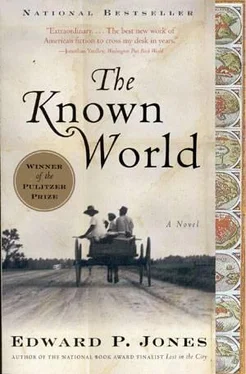“We together, Massa,” Moses said to Skiffington. “Me and Bessie together. She all I have in this world. We is one as a family.”
“I know that,” Skiffington said, trying to write. “Don’t you think I know that?” It occurred to him that a white woman might pass the window and have her sensibilities offended by seeing a naked slave man and he stood and went to the window, as a kind of distraction for any woman passing.
“Please, now, we is one, her and me. We is one.”
Skiffington saw Mrs. Otis strolling on the other side of the street. She stopped to pass the time of day with Mrs. Taylor, who was obviously in the family way. Mrs. Otis had the hand of her youngest child, a boy who had not developed as swiftly as her other children. Mrs. Taylor laughed at something Mrs. Otis said and put her gloved hand briefly to her mouth. She held her unfurled parasol down and to her side. The Otis boy was fascinated by it. Skiffington liked the Otis boy and thought that all he needed was a few years and he would be no different from any other boy his age. “Give him time,” he said more than once to Mr. Otis. He would not say that to Mrs. Otis because she did not believe there was anything wrong with her boy. The boy reached for the parasol and Mrs. Taylor, knowing what he could do if he got hold of it, raised it up and out of his way. While Skiffington was hopeful about the boy’s progress, he was not blind. There had to be a problem with a boy sucking three fingers at a time at twelve years old and afraid to leave his mother’s side because the demons would eat his private parts. It was that boy, along with his older brother and a slave boy named Teacher, who would burst into flames in front of the dry goods store. The younger white boy first going into flames, then followed by his brother. The slave Teacher would go five minutes after that, just as a man with a bucket of water came running up the street.
Moses said once more that they were together and Sawyer told him to be quiet because he was hurting his ears. “I got only her, Massa. We family.”
In moments they were all gone from the jail except Skiffington and his prisoner, who stayed quiet long enough for Skiffington to complete the petition. Then he signed his name and gave his title and ended by putting down the date.
“I will reward you for your assistance, Monsieur Sheriff,” Broussard said after a time. He was on his cot and quite pleased with how things had gone, even though he had Bessie yet to sell.
“I want nothing, Broussard. They pay me for what I do here.”
Broussard jumped up and came to the bars. “But no. No. I want to show how I appreciate.” He pointed to the left wall where Skiffington had hung a map, a browned and yellowed woodcut of some eight feet by six feet. The map had been created by a German, Hans Waldseemuller, who lived in France three centuries before, according to a legend in the bottom right-hand corner. “I live where they make that beautiful map. I know who make them, Monsieur Sheriff, and I can get you better, bigger map. I can do it to show how I appreciate.”
“That one will do fine,” Skiffington said. A Russian who claimed to be a descendant of Waldseemuller had passed through the town and Skiffington had bought the map from him. He wanted it as a present for Winifred but she thought it too hideous to be in her house. Heading the legend were the words “The Known World.” Skiffington suspected the Russian, a man with a white beard down to his stomach, was a Jew but he could not tell a Jew from any other white man.
“I get you better,” Broussard said. “I get you better map, and more map of today. Map of today, how the world out together today, not yesterday, not long ago.” The Russian had told Skiffington that it was the first time the word America had ever been put on a map. The land of North America on the map was smaller than it was in actuality, and where Florida should have been, there was nothing. South America seemed the right size, but it alone of the two continents was called “America.” North America went nameless.
“I’m happy with what I got,” Skiffington said. The map had come from the Russian in twelve parts, each weighing about three pounds, and Skiffington had had a time putting it together. He did it while Winifred and Minerva were away at Clara’s, and when Winifred returned and told him she did not want it in her house, he had to dismantle it and reassemble it again in the jail.
“You see, Monsieur Sheriff,” Broussard said. “I get you better. I get you more better map.”
Jean Broussard was convicted of murder in the first degree and taken to Richmond and hanged. The ne’er-do-well brother-in-law of the prison warden managed to find in Richmond a Roman Catholic priest-a man who was at a time in his life when all the people in his dreams spoke Latin-and that priest, seeking to escape those dreams, stayed night and day with Broussard until the end. The $525 Broussard would have received for the sale of Moses was conveyed by Skiffington to Richmond, who conveyed it to Washington, D.C., who conveyed it to the French embassy. And in five months the money, now in francs, reached Broussard’s widow. Mrs. Broussard never had a fixed idea of America, was never able to comprehend that America was a place of separate states and yet one country at the same time. And with that notion in her head, she was never to understand that the money came from the government of the Commonwealth of Virginia. She, along with her children and her lover, would always believe the money came from the government of the United States of America, and that it was payment for what the government had done to her husband, an American citizen.
The $385 for Bessie, who was sold two weeks after Moses to a blind man and his pious wife in Roanoke, went the same route from the county of Manchester, but somewhere between the county and the ship carrying mail along with discouraged and homesick immigrants returning to Europe, the $385 was lost, or simply taken. Someone enjoyed the money, but it was not the widow Broussard and her children and her lover in Saint-Etienne.
Perhaps it was just as well that Jean Broussard came to the end that he did in America. His family would never have separated from the lover; he would have had to come with them, or they would not have come at all. No, it was over for him in France. Someone had even accidentally broken Broussard’s favorite mug. His family could have done worse than the man his wife took up with. The lover was, in his fashion, quite a religious man. And he was handy with a knife. He could carve out a man’s heart in the time it took for that human machine to go from one beat to another; and with that same knife the lover was able to peel an apple, without sacrificing any of the apple meat, and present it fresh and whole to a waiting child.
If Alm Jorgensen the murdered man had any heirs, no one knew about them.
The records of the Jean Broussard trial, along with most of the judicial records of nineteenth-century Manchester County, were destroyed in a 1912 fire that killed ten people, including the Negro caretaker of the building where the records were kept, and five dogs and two horses. The Broussard trial took one day; actually, part of a day-the trial itself all that morning and the jury deliberations a portion of the summer afternoon. One of the jurors was a man who had studied the law at the College of William and Mary, where his father and grandfather had gone. When that man, Arthur Brindle, returned from the college to Manchester and began practicing, he found that the law was making him a poor man. So he went into dry goods and he made a good living. He suffered from sleepless nights most of his life, this merchant/lawyer did. He and his wife discovered that if he talked to her about his day before he tried going to sleep, he could manage to pull at least two hours of sleep from the night, which was better than the half hour he usually got when they did not talk. And so the night of the day he and the eleven other men convicted Jean Broussard, he lay beside his wife and told her about it. On the stand, Broussard, the merchant said, kept repeating that he was a proud and upstanding American citizen and that he would never hurt another proud and upstanding American citizen if he could help it. It was not this so much, this repetition of who he was, that hurt his case, the merchant said, yawning and listening to the quiet hum that was his ten children sleeping all about the house. It was not that the defense attorney from Culpeper kept telling the jurors Broussard’s Scandinavian partner was not an actual American citizen, though that did not help his case either. It was the accent. The accent gave him “the stench of a dissembler.” Everything Broussard said came out warped because of the accent, even when he spoke his own name. The jurors, the merchant told his wife, would have been able to accept why the partner was killed if Broussard had sat on the stand and told his whole story without an accent.
Читать дальше












